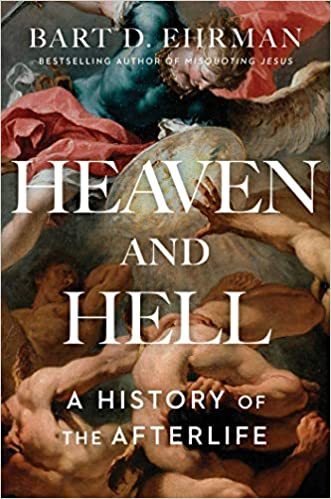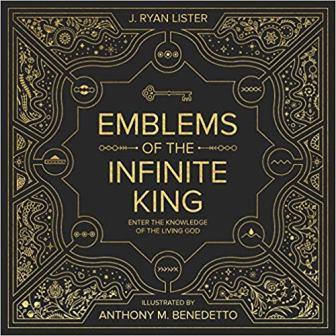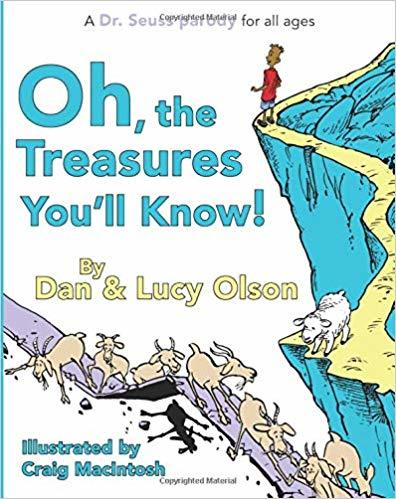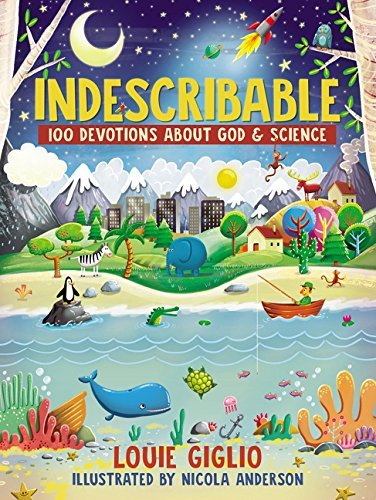Randy Alcorn's Blog, page 87
April 29, 2020
Heaven and Hell: Bart Ehrman’s Latest Attack on Christianity

Note from Randy Alcorn: This is an expanded version of a book review I did for The Gospel Coalition a few weeks ago. For word count purposes, I needed to edit out some important things I wanted to say in that article, but I have included them in this one (hence it is 40% longer). This is more than a book review—it is a reflection on a battle of worldviews that many churches and individual Christians are sadly losing. It’s also a call to take greater efforts to teach our young people to understand and defend their faith in Christ in a culture that is increasingly hostile to the teachings of Scripture.
Bart Ehrman is professor of religious studies at University of North Carolina, Chapel Hill. He also teaches eight of The Great Courses’s widely acclaimed Bible and Christianity classes, and has a part in 78 others. (This is odd, since featuring Ehrman as their primary professor on biblical issues is comparable to selecting N.T. Wright or Wayne Grudem to be their go-to authority on atheism.)
The subtitles of Ehrman’s books, including his five New York Times bestsellers, capture his premises: e.g., Misquoting Jesus: The Story Behind Who Changed the Bible and Why, How Jesus Became God: the Exaltation of a Jewish Preacher from Galilee, and Forged: Writing in the Name of God—Why the Bible’s Authors Are Not Who We Think They Are.
Why even talk about books like this? Because they are having a widespread and powerful influence. Paul warns us of the human proneness to fall prey to false teachers who deny biblical truth: “For the time will come when people will not put up with sound doctrine. Instead, to suit their own desires, they will gather around them a great number of teachers to say what their itching ears want to hear. They will turn their ears away from the truth and turn aside to myths” (2 Timothy 4:3-4).
False teachers influence the church from both inside and outside, but outsiders gain special credibility when they are former insiders. In this era of escalating deconversions, #exvangelicals, and the “Dones” (with church), Ehrman is a major instrument in countless readers’ downward spiritual trajectory. (Skim through some of the 4,000 reviews of his books on Amazon, and you’ll see how weighty his influence is.) His books and teachings online and through the Great Courses are, from one viewpoint, liberating people from a narrow, oppressive, and outdated Christian faith that their parents and pastors imposed on them. (From a different viewpoint, this liberation is bondage in disguise.)
Same Message, New Focus
 Whenever I read an Ehrman book, déjà vu kicks in. His core message is always: “Christians are dead wrong; I know because I used to be one before I became enlightened.” Each of Ehrman’s books deals with something else Christians are wrong about; and his newest, Heaven and Hell: A History of the Afterlife, is another volume in his expanding canon of deconversion doctrine.
Whenever I read an Ehrman book, déjà vu kicks in. His core message is always: “Christians are dead wrong; I know because I used to be one before I became enlightened.” Each of Ehrman’s books deals with something else Christians are wrong about; and his newest, Heaven and Hell: A History of the Afterlife, is another volume in his expanding canon of deconversion doctrine.
Ehrman speaks with the authoritative tone of a historian-philosopher, a wise sage, unfolding humanity’s preoccupation with death and the fear of death. Beginning with the Epic of Gilgamesh, he then examines Homer, Virgil, Plato, and other ancients. Along the way he interjects his belief that there’s no need to fear death, since it’s simply ceasing to exist (the very thing many people fear).
Arriving at the Bible, just one more myth to Ehrman, he presents what he calls the “older Hebrew view” that death is the final end, followed by nonexistence. He then addresses the “later Hebrew position” on resurrection and Judgment Day from the intertestamental era.
While he says little to refute pre-Christian views, once Ehrman gets to the historic Christian view of the afterlife, he conducts an all-out verbal siege. But he doesn’t rant and rave; he calmly presents his assertions, such as that Jesus and Paul disagreed on much, including the way of salvation, but shared a disbelief in an eternal hell. He says both of them, and the author of Revelation (whom he’s certain wasn’t the apostle John), taught annihilationism. He simply ignores or reinterprets passages to the contrary (e.g. Isaiah 66:24; Daniel 12:2; Matthew 25:41, 46; Mark 9:43,48; 2 Thessalonians 1:9; Jude 7, 13; Revelation 14:9–11; 20:10, 14–15).
Ehrman’s thorough and excellent treatment of Homer, Virgil, and Plato stands in stark contrast to his awareness of how Christians historically handled the teachings of Jesus, Paul, and Peter. Ehrman studies the writings of critics with whom he agrees, but I have the impression he relies more on his memories of what he heard at youth group, Moody, and Wheaton than on actual research of what evangelical scholars say. (This may be because “evangelical scholars” is to him an oxymoron.)
Interestingly, though Ehrman doesn’t believe there is a Heaven, he leaves room for its possibility:
I certainly don’t think the notion of a happy afterlife is as irrational as the fires of hell; at least it does not contradict the notion of a benevolent creative force behind the universe. So I’m completely open to the idea and deep down even hopeful about it. But I have to say that at the end of the day I really don’t believe it either. My sense is that this life is all there is. (294)
However, Ehrman is certain he isn’t wrong about Hell:
Are we really to think that God is some kind of transcendent sadist intent on torturing people (or at least willing to allow them to be tortured) for all eternity, a divine being infinitely more vengeful than anyone who has ever existed? …Even if I instinctually fear it, I don’t believe it. (293–94)
At the end of the book Ehrman quotes from ex-evangelical Rob Bell:
In [universalism], the love of God knows no bounds and cannot be overcome. . . . In the words of one modern Christian author, once himself a committed evangelical with a passion for the biblical witness, in the end “Love Wins.” (290)
Ehrman seems to offer universalism as a backup position to his naturalistic worldview. He’s saying, in essence, “I don’t believe in an afterlife, but if there is one then everyone will be in Heaven.”
He goes on to essentially applaud the rise of universalism in Christian churches: “Harkening back to Origen, and Paul before him, these committed believers maintain that in the end no one will be able to resist the love of God. . . . [E]veryone will be saved” (290).
Opinion Isn’t Proof
I admire Ehrman’s skill as a persuasive communicator. He knows how to lay out his position with great effectiveness. (Never mind that this entails considerable overstatement and omission of dismissiveness of evidence to the contrary.) Sadly, he denies the One who gave him those gifts, which makes me wish for the sake of others that he were less eloquent than he is.
Ehrman carefully uses selective information which—in the absence of evidence to the contrary—makes it seem obvious to the jury, his loyal readers, that he is always right. Ehrman would make a skillful defense attorney or prosecutor, as he could argue either side and in the absence of opposition would win his case ever time. (Hence the vulnerability of uninformed believers or unbelievers who read his books.)
Ehrman frequently states what he believes as if opinion constitutes proof. For instance, he emphatically says, “There was a time in human history when no one on the planet believed that there would be a judgment day at the end of time” (8). Really? No one? Does he have private access to an ancient poll taken of every living person?
Ehrman denies the Old Testament ever speaks of resurrection (never mind passages such as Daniel 12:2, which says, “Multitudes who sleep in the dust of the earth will awake: some to everlasting life, others to shame and everlasting contempt”). Ehrman explains in a footnote:
Some readers may wonder why I am not contrasting this view of Job with the famous passage of Job 19:25–26: “For I know that my Redeemer lives, and at the last he will stand upon the earth. And after my skin has been thus destroyed, yet in my flesh I shall see God” (ESV). (301)
I was one of those wondering readers! Ehrman negates Job by citing a Jewish scholar who says, “The text has been garbled and we cannot tell exactly what Job intended to say.” This scholar adds, “Job is almost certainly not talking about seeing God in the afterlife.”
I consulted 12 major translations by different teams of Hebrew scholars, some of whom certainly don’t hold to biblical inerrancy. Their translations contain only minor differences in word choice. All of them suggest Job is indeed speaking of seeing God in the afterlife and affirming that, in what seems clearly to refer to the resurrection, he too will stand with that Redeemer upon a redeemed (New) Earth.
This is just one example of Ehrman’s practice of (1) inaccurately conveying what the Bible says; (2) accurately conveying what the Bible says, then declaring it’s wrong; (3) arguing the text really doesn’t say what Christians believe it says (why would that matter if what it really says is also wrong?); and (4) citing Scripture in support of his contentions, even though he regularly dismisses Scripture’s validity.
When researching my book Heaven, I read more than 150 books on the subject, including many I disagreed with. Yet, in reading Ehrman’s book, I saw no evidence that he had read a single evangelical book on Heaven, though he did manage to cite one on Hell (containing arguments for annihilationism and universalism).
While his footnotes reflect extensive research in ancient Greek texts, he seems largely unaware of what the Bible or evangelical Christians actually claim about Heaven—the New Earth. He refers to Revelation 21:1, and recognizes the teaching of bodily resurrection, yet doesn’t develop what the Bible teaches about the eternal dwelling place of God’s people. I don’t expect him to agree with that teaching, but in a book called Heaven and Hell, I would expect him to give it a chapter, or at least a paragraph or two.
With a few exceptions when he admits he’s not certain, I’m struck by Ehrman’s normally unswerving confidence that he is 100 percent right. He is, just like evangelicals, relying on an ultimate authority—but instead of the Bible, it’s his own intellect. Delivered from that “intellectually feeble” life as an evangelical, his opinions about the Bible, Jesus, and the Christian faith are his creed, the objects of his faith.
Anyone who grounds his life on the belief that Jesus is not God, not the King of Kings or Judge, is naturally going to be resistant to any evidence that He is. After all, a great deal is at stake. The vested interests in not believing in God are every bit as strong as those in believing in God. “Every spirit that acknowledges that Jesus Christ has come in the flesh is from God, but every spirit that does not acknowledge Jesus is not from God. …They are from the world and therefore speak from the viewpoint of the world, and the world listens to them” (1 John 4:2-3, 5).
Apostle of Deconversion
As he does in most of his books, Ehrman seeks to build credibility by sharing his testimony of conversion to unbelief, thereby marketing himself as a reverse C. S. Lewis. Lewis was an academic intellectual who moved from atheism to agnosticism to deism to biblically based Christianity, and in the process burnt academic bridges.
Ehrman, however, professed faith at age 15 at Youth for Christ, then attended Moody Bible Institute and Wheaton College. He was a card-carrying evangelical. His exodus from evangelicalism began when he went to Princeton Seminary, where he lost his faith in the Bible and Jesus:
[At Princeton] my scholarship led me to realize that the Bible was a very human book, with human mistakes and biases and culturally conditioned views in it. And realizing that made me begin to wonder if the beliefs in God and Christ I had held and urged on others were themselves partially biased, culturally conditioned, or even mistaken.
These doubts disturbed me not only because I wanted very much to know the Truth but also because I was afraid of the possible eternal consequences of getting it wrong. . . . What if I ended up no longer believing and then realized too late that my unfaithful change of heart had all been a huge blunder? Wouldn’t my eternal soul be in very serious trouble? (xvi)
Ehrman appears to believe his studies at Princeton were guided by objective truth and his rejection of the Christian worldview was a courageous submission to this truth. Ehrman’s lack of self-awareness is evident when he claims, “In this book I will not be urging you either to believe or disbelieve in the existence of heaven and hell.” No reader could imagine Ehrman is urging belief in Heaven or Hell. But it seems intellectually dishonest to say he isn’t encouraging disbelief in them. Arguably that is a central purpose of the book.
The names of C. S. Lewis, Francis Shaeffer, Lee Strobel, and Ravi Zacharias often show up in the testimonies of those who had intellectually resisted belief in Jesus but came to faith. It’s now common for Ehrman to be credited in someone’s deconversion, particularly because of his credentials as a convinced insider who left the fold to become a vocal skeptic.
In fact, to understand Heaven and Hell and Ehrman’s other writings, we must grasp that his deconversion redirected, rather than removed, his evangelistic zeal. It’s not that he’s no longer on a mission, but that his mission has radically changed. Many people have quietly lost their faith, but Ehrman didn’t go gently into the night. Instead, he has become an eloquent apostle of deconversion, and his disciples are many.
While critics of the faith come and go and many have minimal impact, I regard Ehrman as one of the most significant modern opponents to the Christian faith. Christians who might never be persuaded by scientific atheists like Dawkins, Harris, and Hitchens are regular readers of Ehrman’s books. He’s a secular prophet to certain evangelical and ex-evangelical readers. He has been where they are, and many are headed where he is. His books carry an unspoken but persistent sense of “Come, follow me.”
I considered Ehrman’s writings influential enough to devote an entire chapter in my book If God Is Good to his book God’s Problem. Both books center on the problem of evil and suffering, but with radically different conclusions. Remarkably, Ehrman argues there that one of his primary reasons for rejecting the Christian faith is poverty and suffering in other parts of the world. Yet he fails to realize that those actually suffering have turned to faith in Christ in huge numbers.
The subtitle of God’s Problem is “How the Bible Fails to Answer Our Most Important Question—Why We Suffer.” When reading it, I had spent the previous two years studying what the Bible has to say about suffering, why we suffer, and what God has done in Christ to address our suffering. After reading every page of Ehrman’s book I thought a more honest subtitle would be “I Don’t Like the Answers to Suffering That the Bible Gives.” (See the full chapter from my book, or an abridged version of it.)
Call to Hold Fast
I feel sorry for Bart Ehrman, but I’m even more saddened at the harm done to those who embrace his teachings. We who believe the Bible must recognize this is about our adversary, Satan, who comes to destroy and devour people through persuasive arguments, and who when he lies, “speaks his native language” (John 8:44, NIV).
In a time when “everyone has a story,” people listen to stories without discernment. The personal testimony has historically been used by faith-affirmers to reach the lost. Now it has become a tool of faith-deniers to reach the found.
There are still wonderful conversion stories, and we should tell them. But we should also, in our families and churches, teach our children to cultivate their intellects, and we should help equip them to refute falsehood and denials of the written and living Word of God. We should demonstrate the transcendent vibrancy of a generous, Christ-centered, and people-loving life, enlightened by the authentic God-man Jesus, full of grace and truth.
Finally, as we call on God to do the miraculous work of conversion in people’s lives, we “must hold firmly to the trustworthy message as it has been taught, so that [we] can encourage others by sound doctrine and refute those who oppose it. For there are many rebellious people, full of meaningless talk and deception” (Titus 1:9-10).
Photo by Jonatan Pie on Unsplash
April 27, 2020
Charles Spurgeon on Sowing in Tears, Reaping in Joy

I recently read these words from one of Charles Spurgeon’s sermons, and found them both timely and encouraging:
It will sometimes happen that where there is the most sorrow in the antecedents, there will be the most pleasure in the sequel. As the furious storm gives place to the clear sunshine, so the night of weeping precedes the morning of joy. Sorrow the harbinger; gladness the prince it ushers in.
[William] Cowper says: “The path of sorrow, and that path alone, Leads to the place where sorrow is unknown.”
To a great extent we find that we must sow in tears before we can reap in joy. Many of our works for Christ have cost us tears. Difficulties and disappointments have wrung our soul with anguish. Yet those projects that have cost us more than ordinary sorrow, have often turned out to be the most honorable of our undertakings. …You may expect a blessing in serving God if you are enabled to persevere under many discouragements. The ship is often long coming home, because detained on the road by excess of cargo. Expect her freight to be the better when she reaches the port.
As I’ve shared before, reading and discussing biographies of faithful believers can give both children and adults footprints to follow, especially through our suffering. So let me recommend John Piper’s excellent presentations on the life of Charles Spurgeon and the life of William Cowper (whom Spurgeon quoted above).
If you’d like to read more from Spurgeon, see my book We Shall See God. In writing that book, I became Spurgeon’s coauthor, without his permission, drawing extensively from the best of his sermons about Heaven and the New Earth and adding my own thoughts, so it’s about half and half. If the saying “it’s easier to get forgiveness than permission” ever applied, I’m confident it will when I meet Spurgeon and explain how he and I wrote a book together. :) It may help to tell him that all the royalties went to causes he would endorse!
Photo by chuttersnap on Unsplash
April 24, 2020
Great Books to Share with Your Kids, and Thoughts on Encouraging the Next Generation to Read

I grew up in a non-christian home and learned love reading through comic books: Archie and the Marvel comics among them, especially the Fantastic Four. But mainly I was a DC fan, my favorites being The Justice League of America (Green Lantern was my hero) and The Legion of Super Heroes (go, Lightning Lad). From there I dove into science fiction and fantasy, spending my nights looking through my telescope, then coming to bed freezing and reading science fiction by flashlight under my covers, so Mom wouldn’t see the light on.
Much as I would have enjoyed video games and computers as a boy, I’m profoundly grateful they didn't exist then. If they would have, I’m afraid I wouldn’t have come to love reading as I did. (That creates a real challenge for today’s Christian parents, doesn’t it? How do you cultivate a love for reading in children, especially your boys, when there is so much in our culture working against it? And especially when we remember that those who are not readers will not be readers of God's Word.)
I think of how God had His hand on my life long before I was in high school, when I read for the first time a book that really captivated me...the Bible. That book came alive to me when I met the Author, who soon became my best friend.
That’s why my advice to parents is read to and with your children! A child who doesn’t learn to love to read will not love to read God's Word, and will be robbed of joy and perspective. The love of reading is a delight far more satisfying than the love of movies and video games, which is not inherently evil, but will generally not foster the spiritual life. A love for reading must be instilled early, as it seldom develops later. So read to your kids and give them great books to read! (And also model to them the importance of reading as an adult.)
I share some more thoughts on my childhood love of reading, and the importance of passing on that love to the next generation, in this video:
Here are some great books to consider sharing with your kids:
 The Jesus Story Book Bible and Thoughts to Make Your Heart Sing by Sally Lloyd Jones
The Jesus Story Book Bible and Thoughts to Make Your Heart Sing by Sally Lloyd Jones
The Jesus Story Book is the best Bible storybook for kids I’ve seen. (I enjoyed reading it with my grandsons when they were younger.) Thoughts to Make Your Heart Sing is a children’s devotional also written by Sally Lloyd Jones. Stephanie Anderson, one of our staff members, writes, “I love the short and sweet little devotional thoughts in this book, with beautiful illustrations by Jago. I also love that Sally quotes from theologians and heroes of the faith. I’ve enjoyed starting my mornings with my girls using this book.”
 Emblems of the Infinite King by J. Ryan Lister
Emblems of the Infinite King by J. Ryan Lister
This book introduces kids ages 10+ to God’s radiant beauty using the main categories of systematic theology. When sound systematic theology is conveyed to kids in a vibrant and accessible way, it is a victory to be celebrated. Emblems of the Infinite King does this!
My daughter Karina, mom to three boys, writes, “I’m reading Emblems of the Infinite King with my grade schooler and middle schooler. It's a beautiful book that unfolds systematic theology in a narrative form for kids. My boys, who love storytelling, are very engaged with both the text and the illustrations. We often make connections with Scripture and the Apostles’ Creed, so they can see how we evaluate beauty in light of revealed truth. I've found it to be an excellent next step after the Jesus Storybook Bible, as kids get older and are ready for more conceptual learning.”
 Oh, the Treasures You'll Know! by Dan Olson and Lucy Olson
Oh, the Treasures You'll Know! by Dan Olson and Lucy Olson
This Christian parody of Dr. Seuss’s Oh, the Places You’ll Go! is a witty, wonderful, and beautifully illustrated book about following God’s narrow path and storing up treasures in Heaven that will never be lost. It’s a delightful book.
 The Biggest Story by Kevin DeYoung
The Biggest Story by Kevin DeYoung
Both young and old will enjoy Kevin’s book. The Biggest Story is a small treatment of a huge theme—God’s drama of redemption, centered on Jesus Christ. Kevin’s words are fresh, engaging, playful, and biblical. Many Bible storybooks offer pearls without a string. This one puts the pearls on a string—the right one. The result is magnificent and memorable.
 Indescribable and How Great Is Our God by Louie Giglio
Indescribable and How Great Is Our God by Louie Giglio
EPM staff member Stephanie Anderson writes: “Our girls, ages five and ten, have loved these devotionals. They’re well written and full of fascinating scientific facts, which Louie then masterfully ties in with themes from Scripture. Even my husband and I have learned many new things, and we like the emphasis on science not being at odds with our faith, but rather being a means of appreciating and learning about the Creator.”
The Action Bible, which my grandsons love, has sold over a million copies. It’s proven that the Bible in graphic novel form can be both engaging and Christ-honoring. Kids eight and older and many adults love it. I find it true to Scripture. (See also The Kingstone Bible¸ which my graphic novel The Apostle is a part of. It’s the longest single graphic novel ever published, as well as the most complete graphic novel adaptation of the Bible, and is available in three volumes.)
 The Chronicles of Narnia by C. S. Lewis
The Chronicles of Narnia by C. S. Lewis
Through Lewis’s Narnia series, we and our children can learn to envision the promised Heaven on Earth in a biblical and compelling way. I encourage parents to read them aloud to their family or to listen to the complete books in radio theatre audio productions copublished by Tyndale and Focus on the Family.
More fiction recommendations: EPM staff member Amy Woodard shared that her young teen girl has liked the Christy Miller Series by Robin Jones Gunn. Her kids have also enjoyed the Cul-De-Sac Kids book series by Beverly Lewis.
Here are some book recommendations from The Gospel Coalition:
The Garden, the Curtain, and the Cross by Carl Laferton
God’s Very Good Idea by Trillia Newbell
The Ology by Marty Machowski
The Donkey Who Carried a King by R.C. Sproul
The Gospel by Devon Provencher
God by Devon Provencher
Jesus by Devon Provencher
The Friend Who Forgives by Dan DeWitt
Jesus and the Lion’s Den by Alison Mitchell
 If you’d like to introduce your kids to a biblical view of Heaven, you can check out my books Heaven for Kids (a chapter book intended for ages 8 to 12, but would work well for a family to read through, and also available as an audio book), Tell Me About Heaven (readable by many eight year olds, but designed to be enjoyed by the whole family; it contains eleven fantastic paintings by my friend, artist Ron DiCianni), and Wait Until Then (a picture book that emphasizes, in story fashion, that according to God’s Word, the best is yet to be; it’s now of out print but used copies are available on Amazon). Older kids might also enjoy my graphic novel Eternity (based on Christ’s story of the rich man and Lazarus found in Luke 16; the graphics were done by two artists who’ve worked with Marvel Comics).
If you’d like to introduce your kids to a biblical view of Heaven, you can check out my books Heaven for Kids (a chapter book intended for ages 8 to 12, but would work well for a family to read through, and also available as an audio book), Tell Me About Heaven (readable by many eight year olds, but designed to be enjoyed by the whole family; it contains eleven fantastic paintings by my friend, artist Ron DiCianni), and Wait Until Then (a picture book that emphasizes, in story fashion, that according to God’s Word, the best is yet to be; it’s now of out print but used copies are available on Amazon). Older kids might also enjoy my graphic novel Eternity (based on Christ’s story of the rich man and Lazarus found in Luke 16; the graphics were done by two artists who’ve worked with Marvel Comics).
Finally, you can find more recommendation and ideas in Trevin Wax’s book recommendations for preschoolers, and Justin Taylor’s article with a list of recommended reading for kids, grade by grade. And here’s a great article about pointing your kids to the gospel through good books.
April 22, 2020
The Anger Problem in Sports and All of Life (Including in Our Families and Relationships)

I put these verses together for a wonderful young man who loves Jesus, and was struggling with getting angry during sports, especially with referees. (Of course, some who are just spectators, even in their own living rooms, struggle with perpetual complaining and whining about bad calls which they sincerely believe are always against their team, and these verses can help them as well.)
Right now most, nearly all, professional and local sports are cancelled due to the coronavirus crisis. But with many families staying home together, there will certainly be times when we struggle with anger and frustration towards one another. So what I share here will be applicable for any reader who struggles with anger, not just those who are athletes or enjoy watching sports.
For those who wonder if it could be discouraging for a young athlete (or anyone) to be given these verses, I think it’s an important reminder that God doesn’t just call us to make each other feel better but to help each other be better. And coming to terms with anger is one of those things. If we get victory in this area it not only glorifies God but also brings peace and contentment to our own lives.
Of course, I too have various areas of weakness (at one time anger was one of them, but God has graciously helped me grow in that area). I have invited others, including the young man talking with me about anger in sports, to let me know if they see or sense I’m not honoring Jesus in any area of my life. Tim Keller writes in God’s Wisdom for Navigating Life, “Self-deception is not the worst thing you can do, but it’s the means by which we do the very worst things. The sin that is most distorting your life right now is the one you can’t see.” That’s why we all need this kind of input from other Christ followers: “Speaking the truth in love, let us grow in every way into him who is the head—Christ” (Ephesians 4:15).
If you struggle with anger, it would be great for you to read these verses daily, mediate on them, memorize some of them, and ask God to give you victory. I do this in my own life in areas of struggle, and every Christian must do the same to experience the change we want, and in order to please and glorify Jesus. “Do not conform to the pattern of this world, but be transformed by the renewing of your mind. Then you will be able to test and approve what God’s will is—his good, pleasing and perfect will” (Romans 12:2).
Here’s what God says to us. May He use it to renew our minds:
“People with quick tempers cause a lot of quarreling and trouble.” (Proverbs 29:22, GNB)
“Don’t give in to worry or anger; it only leads to trouble.” (Psalm 37:8, GNB)
“…human anger does not produce the righteousness that God desires.” (James 1:20, NIV)
“If you become angry, do not let your anger lead you into sin.” (Ephesians 4:26, GNB)
“People with a hot temper do foolish things; wiser people remain calm.” (Proverbs 14:17, GNB)
“My dear brothers and sisters, take note of this: Everyone should be quick to listen, slow to speak and slow to become angry, because human anger does not produce the righteousness that God desires.” (James 1:19-20, NIV)
“Those who control their anger have great understanding; those with a hasty temper will make mistakes.” (Proverbs 14:29, NLT)
“What causes quarrels and what causes fights among you? Is it not this, that your passions are at war within you? You desire and do not have, so you murder. You covet and cannot obtain, so you fight and quarrel. You do not have, because you do not ask.” (James 4:1-2, ESV)
“Do not make friends with a hot-tempered person, do not associate with one easily angered.” (Proverbs 22:24, NIV)
“Fools give full vent to their rage, but the wise bring calm in the end.” (Proverbs 29:11, NIV)
If you or someone in your family struggles with anger…or irritation, complaining, or bitterness, I highly recommend David Powlison’s book Good and Angry. I think you’ll find it a great help.
Photo by Marc Szeglat on Unsplash
April 20, 2020
What Looks Like a Disaster May in Fact Be Grace

Nanci and I have been reading Paul David Tripp’s book New Morning Mercies: A Daily Gospel Devotional. It is just terrific, and we highly recommend it.
In his March 31 entry, Paul talks about how Christ’s darkest moment gives us hope when we face our own dark times. Even though we already celebrated Good Friday and Easter Sunday, the message of Christ’s sacrifice, God’s redemptive work, and the hope we have in Him is always timely. I hope you’ll take Paul’s advice and trust that God is using even the disasters in your life as “tools of redemption.” —Randy Alcorn
At the center of a biblical worldview is this radical recognition—the most horrible thing that ever happened was the most wonderful thing that ever happened. Consider the cross of Jesus Christ. Could it be possible for something to happen that was more terrible than this? Could any injustice be greater? Could any loss be more painful? Could any suffering be worse? The only man who ever lived a life that was perfect in every way possible, who gave his life for the sacrifice of many, and who willingly suffered from birth to death in loyalty to his calling was cruelly and publicly murdered in the most vicious of ways. How could it happen that the Son of Man could die? How could it happen that men could capture and torture the Messiah? Was this not the end of everything good, true, and beautiful? If this could happen, is there any hope for the world?
Well, the answer is yes. There is hope! The cross was not the end of the story! In God’s righteous and wise plan, this dark and disastrous moment was ordained to be the moment that would fix all the dark and disastrous things that sin had done to the world. This moment of death was at the same time a moment of life. This hopeless moment was the moment when eternal hope was given. This terrible moment of injustice was at the very same time a moment of amazing grace. This moment of extreme suffering guaranteed that suffering would end one day, once and for all. This moment of sadness welcomed us to eternal joy of heart and life. The capture and death of Christ simultaneously purchased for us life and freedom. The very worst thing that could happen was at the very same time the very best thing that could happen. Only God is able to do such a thing.
The same God who planned that the worst thing would be the best thing is your Father. He rules over every moment in your life, and in powerful grace he is able to do for you just what he did in redemptive history. He takes the disasters in your life and makes them tools of redemption. He takes your failure and employs it as a tool of grace. He uses the “death” of the fallen world to motivate you to reach out for life. The hardest things in your life become the sweetest tools of grace in his wise and loving hands.
So be careful how you make sense of your life. What looks like a disaster may in fact be grace. What looks like the end may be the beginning. What looks hopeless may be God’s instrument to give you real and lasting hope. Your Father is committed to taking what seems so bad and turning it into something that is very, very good.
Taken from New Morning Mercies by Paul David Tripp, © 2014, March 31 entry. Used by permission of Crossway, a publishing ministry of Good News Publishers, Wheaton, IL 60187, www.crossway.org.
Photo by Ravi Roshan on Unsplash
April 17, 2020
Are You Weary? Rest in God’s Promise to Be Your Strength

Today’s guest blog is by Stephanie Anderson, EPM staff member. Steph is one of the most Christ-centered, biblically-grounded, and highly skilled people I know. I marvel at the work she does, and the same is true of the rest of our staff. But when you’re a hard worker, as a mom, nurse, business person, farmer, or anything else, you need to pay special attention to Jesus the Rest-giver, who gives us this beautiful invitation: “Come to me, all of you who are tired from carrying heavy loads, and I will give you rest” (Matthew 11:28, GNT).
There are countless good books, both nonfiction and fiction, which can feed your soul and mind, and many of them (not all) will help you relax. Here’s a book list I put together years ago that was recently updated and revised by Chelsea Dudley, now covering many resources in addition to books. Too much news overload these days will burn you out, but good books, including audio books, can entertain and not stress you out in the process. Nanci and I have listened to a few dozen audio books already this year, including the entire England-based Cherringham Cosy Crime series, which are short and engaging mysteries without blood and gore and bad language. (BTW, though it’s spelled cozy in the USA, it’s cosy in most of the rest of the English-speaking world.)
Here’s a video recommendation for those who, like Stephanie, are needing to find rest that is spiritually uplifting in ways that binge watching, for instance, rarely is: view the 2003 movie The Gospel of John, free on Amazon Prime. Nanci and I watched it again last week. It’s WORD FOR WORD the Gospel of John (GNT) and is a wonderful visual display. I wept at the wonder of God’s Word revealing Jesus. It’s magnificent. Therapy for the soul, every word from Him!
Also, we highly recommend you watch the eight episodes of the new TV series The Chosen (plus the pilot called “The Shepherd”) which so far has covered the early ministry of Jesus. I think you’ll really enjoy it!
Okay, below are Stephanie’s excellent thoughts. —Randy Alcorn
There have been so many incredible, Christ-centered articles written lately and videos recorded about how we are to think, who we are to be, and what we are to do during this coronavirus crisis. I’m grateful for them.
But I have a confession.
I’ve reached my saturation point. Right now I am simply overwhelmed by reading and listening to them. The type-A, perfectionistic part of me hears, “Just do more. Be more” at a time when I feel like I have even less to give.
This morning, as I rolled out of bed and put my feet on the floor, I thought, Here’s another day. And I’m tired. It’s not even breakfast time, and I’m already weary.
With not much to distinguish between the days of the week (what day is it today?!), my life has taken on a routine of schooling my children, finishing my work, and getting dinner on the table, in that order. All of it is good! All of it is necessary. These are the responsibilities the Lord has given me, and they are the ways I can serve Him with joy right now.
Still, most days that’s about all I’m able to accomplish.
I’m truly grateful for my family and my life, especially when I consider how many people around the world are experiencing severe suffering and loss because of the coronavirus. Overall, I have it pretty easy. (The sun is even shining in the Pacific Northwest, a great cause for rejoicing!)
But that doesn’t mean this season isn’t hard. All of us, in some sense, are facing losses, struggles, and anxieties that are draining and difficult.
Here in Oregon, last week we learned that school is officially cancelled for the rest of the school year. While most of us knew that announcement was coming, I’ve been struck by how my reaction to this news felt like…grief. And it wasn’t just me. My social media feeds have been filled with heartfelt laments from teacher friends who are missing their students and mom friends who are mourning their children’s losses—and their own losses, too. No senior events. No kindergarten or 8th grade or high school graduations. No spring sports and no recitals. No field trips, no end-the-school-year festivities.
Add to that economic pressures, concerns for those we love, and the loss of physical connection with friends and family and church bodies because of social distancing.
Yes, this season is hard.
And I think I am not alone in feeling weary.
He Is Our Strength
As I got myself ready this morning, I prayed what’s a familiar prayer lately: Lord, I desperately need your strength.
This reminded me of the first verse of a Psalm our church is memorizing together while we’re apart physically:
“God is our refuge and strength, an ever-present help in trouble” (Psalm 46:1).
Then I remembered some advice from my hero Joni Eareckson Tada that has stuck with me over the years, and later this morning, I reread it: “…the Apostle Paul said, ‘Boast in your afflictions.’ Don’t be ashamed of them. Don’t think you have to hide them and gussy yourself up before God in the morning so that He’ll be happy with you and see that you’re really believing in Him. No, no, no. Admit you can’t do this thing called life. Then cast yourself at the mercy of God and let Him show up through your weakness because that’s what He promises—2 Corinthians 12:9.”
Yes, that’s what I need. To admit my weakness, and to trust in the promise of God’s infinite, ever-accessible strength.
I don’t need another to-do list or more expectations for myself. Right now, I need His rest.
I don’t need to be consumed by all I have to do or should be doing. I do need to stop and focus on the Savior. I can trust that through His Word, His Holy Spirit, and the encouragement of His people, He will direct me to what I should be doing in this season, and He will empower me to do it.
I need His help. His comfort. His peace. His direction.
I’m so glad that’s exactly what He promises. Jesus told us, “Take my yoke upon you, and learn from me, for I am gentle and lowly in heart, and you will find rest for your souls” (Matthew 11:29).
Our God is “the God of endurance and encouragement” (Romans 15:5). How I love that phrase! Endurance. Encouragement. Two things I desperately need right now, and that only He can provide for me.
Words for the Weak
We may forget from time to time just how needy we are, but God knows our weaknesses. His Word overflows with good news for the weary—promises to give strength and rest to His children:
“The Lord is my strength and my shield; my heart trusts in him, and I am helped. Therefore my heart celebrates, and I give thanks to him with my song. The Lord is the strength of his people; he is a stronghold of salvation for his anointed. Save your people, bless your possession, shepherd them, and carry them forever” (Psalm 28:7-9, CSB).
“The LORD gives his people strength; the LORD blesses his people with peace” (Psalm 29:11, CSB).
“Have you not known? Have you not heard?
The LORD is the everlasting God,
the Creator of the ends of the earth.
He does not faint or grow weary;
his understanding is unsearchable.
He gives power to the faint,
and to him who has no might he increases strength.
Even youths shall faint and be weary,
and young men shall fall exhausted;
but they who wait for the LORD shall renew their strength;
they shall mount up with wings like eagles;
they shall run and not be weary;
they shall walk and not faint” (Isaiah 40:28-31, ESV).
“Fear not, for I am with you; be not dismayed, for I am your God; I will strengthen you, I will help you, I will uphold you with my righteous right hand” (Isaiah 41:10, ESV).
“May our Lord Jesus Christ himself and God our Father, who loved us and by his grace gave us eternal encouragement and good hope, encourage your hearts and strengthen you in every good deed and word” (2 Thessalonians 2:16-17, NIV).
Just Rest
So here I am, still going through the same day-to-day-routine, but looking to God’s strength. I’m asking Him to open my eyes to the needs of those around me that I might miss right now in my weariness. I’m praying He will give me the ability to meet those needs, for His glory, and grant me the strength to serve my family and do the work He has given me to do, with joy and thanksgiving.
I’m trusting that I don’t need to be more or do more in my own strength.
I simply need to rest in His strength.
Here’s more encouragement from God’s people that I have found helpful:
“Come, and however feeble you feel, just wait in His presence. As a feeble, sickly invalid is brought out into the sunshine to let its warmth go through him, come with all that is dark and cold in you into the sunshine of God's holy, omnipotent love. Sit and wait there, with the one thought: Here I am, in the sunshine of His love. As the sun does its work in the weak one who seeks its rays, God will do His work in you.” —Andrew Murray
“Sometimes, in moments of pride, we need to fear Him and repent. Other times, in moments of brokenness and despair, we need to just bathe in His grace, and see His smile and hear Him say, ‘Well done, enter into your Master’s joy.’ We need to cast our cares upon Him, because He cares for us, come onto Him when we’re weary and heavy laden, and He will give us rest.” —Randy Alcorn
“When really weak in ourselves, and conscious of that weakness, we are in the state suited to the manifestation of the power of God. When emptied of ourselves, we are filled with God. Those who think they can change their own hearts, atone for their own sins, subdue the power of evil in their own souls or in the souls of others, who feel able to sustain themselves under affliction, God leaves to their own resources. But when they feel and acknowledge their weakness, He communicates to them divine strength.” —Charles Hodge
“Remember, it is not your weakness that will get in the way of God’s working through you, but your delusions of strength. His strength is made perfect in our weakness! Point to His strength by being willing to admit your weakness.” —Paul David Tripp
“Trying to do the Lord’s work in your own strength is the most confusing, exhausting, and tedious of all work. But when you are filled with the Holy Spirit, then the ministry of Jesus just flows out of you.” —Corrie ten Boom
Also, The Gospel Coalition has a wonderful article by Clarissa Moll about Trading Your Weakness for God’s Strength . Don’t miss it.
See also Randy’s article Can’t You See That I’m Busy? You might also enjoy his books 60 Days of Happiness and God’s Promise of Happiness.
April 15, 2020
Losing Your Faith May Be God’s Gift to You

Two weeks ago, I was asked to be a guest on the Chris Fabry show. I always enjoy talking with Chris, and we had a good conversation about some perspectives related to the coronavirus crisis. (You can listen to our 21-minute conversation here.)
One thing that came up as we talked was that Scripture makes it clear God’s people will face great suffering, as some are right now. As serious as suffering is, it’s always struck me as a bit humorous when Peter writes, “Dear friends, do not be surprised at the fiery ordeal that has come on you to test you, as though something strange were happening to you” (1 Peter 4:12, emphasis added).
Unfortunately, if our theology hasn’t prepared us for suffering, we may be more than just surprised when trials come our way. We might feel as though our faith—and God Himself—has let us down.
In my book If God Is Good, I write this:
A faith that leaves us unprepared for suffering is a false faith that deserves to be lost.
A lot of bad theology inevitably surfaces when we face suffering. John Piper writes, “Wimpy worldviews make wimpy Christians. And wimpy Christians won’t survive the days ahead.”
Auschwitz survivor Viktor Frankl wrote, “Just as the small fire is extinguished by the storm whereas a large fire is enhanced by it, likewise a weak faith is weakened by predicaments and catastrophes whereas a strong faith is strengthened by them.” When people lose their faith because of suffering, it’s usually a weak or nominal faith that doesn’t account for or prepare them for evil and suffering. I believe that any faith not based on the truth needs to be lost. The sooner, the better.
Believing God exists is not the same as trusting the God who exists. A nominal Christian often discovers in suffering that his faith has been in his church, denomination, or family tradition, but not Christ. As he faces evil and suffering, he may lose his faith. But that’s actually a good thing. I have sympathy for people who lose their faith, but any faith lost in suffering wasn’t a faith worth keeping. (Genuine faith will be tested; false faith will be lost.)
If you base your faith on lack of affliction, your faith lives on the brink of extinction and will fall apart because of a frightening diagnosis or a shattering phone call. Token faith will not survive suffering, nor should it.
Suffering and evil exert a force that either pushes us away from God or pulls us toward him. I know a man who lost his faith after facing terrible evil, suffering, and injustice. My heart breaks for him, and I pray that my family and I will never suffer what he did. But if personal suffering gives sufficient evidence that God doesn’t exist, then surely I shouldn’t wait until I suffer to conclude he’s a myth. If my suffering would one day justify denying God, then I should deny him now in light of other people’s suffering.
The devastation of tragedy feels just as real for people whose faith endures suffering. But because they know that others have suffered and learned to trust God anyway, they can apply that trust to God as they face their own disasters. Because they do not place their hope for health and abundance and secure relationships in this life, but in an eternal life to come, their hope remains firm regardless of what happens.
Losing your faith may be God’s gift to you. Only when you jettison ungrounded and untrue faith can you replace it with valid faith in the true God—faith that can pass, and even find strength in, the most formidable of life’s tests.
In her moving book The Year of Magical Thinking, Joan Didion writes about the sudden, unexpected death of her husband. As I read, my heart broke not only for what happened to her, but for the first six words of the book’s concluding sentence: “No eye is on the sparrow.”
Didion apparently means that so far as she can tell, there is no God, or at least, no God who cares and watches over us. She’s most likely a normal hurting person who needs men and women around her who can see God in the midst of their suffering, so they might help her see him in hers.
As I told Chris, there are probably many people who need to lose their faith—because their faith is in the wrong thing. I believe God can use this crisis to topple our idols, including but not limited to the idols of health and wealth, and clear the way for us to embrace genuine trust in Christ.
So let’s fix our eyes on Jesus, the author and finisher of our faith. Let’s make Him the object of our faith. He will support us and sustain us and be there for us in a way that no other object of faith can.
Photo by Dawid Zawiła on Unsplash
April 13, 2020
If You Don’t Really Need Your Stimulus Check, Would You Prayerfully Consider Giving It to God’s Kingdom?

There are many Americans who are anticipating receiving their coronavirus stimulus check from the government because they truly need the money in order to pay bills and care for their families right now. But if you’re in a position where this money would just go into your savings account or to fund wants but not needs, I would like to make what might seem to be a radical suggestion. Would you prayerfully consider giving it away to God’s kingdom? That’s what we’re going to do. And if you can, please join us.
Disclaimers:
First, I am well aware that some people actually will need this money. I’m not assuming no one should spend it on themselves! Rather, I'm speaking to those who, like us, do not have such a need at this time.
Second, I'm not suggesting you donate the money to EPM! Here are some ideas:
1) Your local church has probably experienced reduced giving and needs your support to continue to pay staff salaries.
2) There are many ministries, including missions organizations doing Bible translation for unreached people groups, whose major donors (many of whom own businesses) are struggling financially due to the epidemic. To sustain these vital projects others are needed to step in as givers if they are able to do so. (See illumiNations.)
3) There are excellent Christ-centered, gospel-proclaiming ministries that are, at great expense and considerable risk, putting themselves on the frontlines by giving medical assistance in Italy, New York City, and other parts of the U.S. and the world. Samaritan’s Purse is among those.
(For more ideas where to give your check, check out EPM’s list of recommended organizations .)
A friend of our ministry sent this note:
When I heard we were getting a stimulus check of $1,200, I realized I was in a place that I did not “need” this money. Our income had not changed that much due to the COVID-19 virus. I asked God what He would want me to do with this and when I received a giving invitation from a ministry named Kizimani, I knew instantly that was where He wanted me to give. My husband was fully on board, of course. I immediately responded and pledged the money (knowing that my heart can change so quickly in a given moment).
I felt such joy! But I wondered, with all we have couldn’t we give more? I’m still wrestling with that. I wish I could say we emptied our bank account but I’m praying God would make us pliable and that we would listen to what He wants us to do.
I don’t want this to turn into “look what we're doing.” But I can’t help wanting to let people know that this extra income is an opportunity to give to those in need.
In my book Giving Is the Good Life, I share how Jesus told His disciples a parable in which He described a “faithful and wise manager” as one who gave his servants food and other resources “at the proper time.” When the master returned and saw one servant faithfully managing his resources, he “put him in charge of all his possessions” (Luke 12:42-44, NIV). Jesus continued the parable by describing an unfaithful servant who forgot about his master and failed to manage his assets according to his principles. This servant got drunk and beat the other servants. Jesus promised the master would return when the servant didn’t expect it and bring harsh judgment on him (Luke 12:45-47).
In contrast to the faithful servant, the unfaithful servant mismanaged the master’s resources. Instead of carefully managing the owner’s possessions, he greedily squandered them on himself.
Jesus then summarized the point of the parable with these words: “Everyone to whom much was given, of him much will be required, and from him to whom they entrusted much, they will demand the more” (Luke 12:48).
Make no mistake about it, you and I—who live in the most affluent society in human history, even in an economic downturn—have been entrusted with much. So in light of Jesus’ words, we need to ask ourselves, Am I a faithful servant or an unfaithful servant when it comes to what I do with my Lord’s resources?
God entrusts a fortune even to many who spend their lives wishing they made more. We will answer to Him for what we’ve done with what we have (Romans 14:12). Where did that money go? What needs did we meet with it, both inside and outside our families? What difference did it make for eternity? Did it pierce our lives with grief because we clung to it, or did it fill our lives with joy because we honored God with it?
Paul said that “God loves a cheerful giver” (2 Corinthians 9:7, ESV). What keeps us from giving cheerfully? We instinctively imagine that hoarding or spending on ourselves will make us happiest. But Jesus said our greatest joy comes when we give to others: “There is more happiness in giving than in receiving” (Acts 20:35, GNT). You might have heard that verse translated “It is more blessed to give than receive,” but the well-documented fact is that the Greek word makarios here, translated “blessed,” really means “happy” or “happy-making.”
Notice what Jesus did not say: “Naturally, we’re happier when we receive than when we give, but giving is a duty, so grit your teeth, make the sacrifice, and force yourself to give.”
Money won’t make us happy, but giving away money can make us profoundly happy! When we give out of love for Christ and others, we experience dramatic and lasting returns for the investments we’ve made—far more than if we’d kept or spent it. Therefore, it’s not only receivers who come out ahead—it’s givers, too.
In the novel Fahrenheit 451, Ray Bradbury said, “Everyone must leave something behind when he dies. . . . The difference between the man who just cuts lawns and a real gardener is in the touching. . . . The lawn-cutter might just as well not have been there at all; the gardener will be there a lifetime.”
As believers in Christ, we have the opportunity not just to tend flowers but to tend to people and leave an eternal impact, all for God’s glory. May we never settle for anything less.
A Note about Charitable Giving Incentives
Care Net, a prolife ministry EPM recommends, shared this information about how the Coronavirus Aid, Relief, and Economic Security (CARES) Act provides “significant tax incentives to stimulate increased charitable giving in the next few months to non-profit organizations”:
Charitable gifts up to $300 are now 100% deductible. Previously, you could only use the charitable giving deduction if you itemized your deductions. Now, the CARES Act allows you to deduct up to $300 of charitable gifts, given in cash, whether you itemize or not. Here is a helpful article on Yahoo! Finance.
The deduction for gifts over $300 has been raised to 100% of your Adjusted Gross Income. Under the CARES Act, donors can get a federal income tax deduction for charitable contributions of up to 100% of their Adjusted Gross Income (AGI) for 2020, replacing the previous 60% of AGI charitable contribution limit. Charitable contributions in excess of this amount can be carried forward for five years subject to the 60% of AGI limit in those years.
April 10, 2020
Sorrow Will Turn to Joy: Easter Reflections from Our Daughter Angela

Both of our daughters, Karina and Angela, are Christ-centered women and wonderful wives and moms who serve their families and churches remarkably well. They are very wise, and I have learned a lot from both of them.
Angela Stump is a part-time nurse, and the women’s ministry director at Gresham Bible Church, where she and her husband Dan are both very involved. I am so touched by her heart and her trust in her Savior. Like her sister, she’s among the most godly people I know.
The following is an Easter devotional Angela wrote this week for the women at her church. I hope her message of joy after sorrow will encourage your heart as you anticipate celebrating Easter Sunday, despite the difficulties of life in this season. —Randy Alcorn
“A little while, and you will see me no longer; and again a little while, and you will see me.”So some of his disciples said to one another, “What is this that he says to us, ‘A little while, and you will not see me, and again a little while, and you will see me’; and, ‘because I am going to the Father’?”So they were saying, “What does he mean by ‘a little while’? We do not know what he is talking about.” Jesus knew that they wanted to ask him, so he said to them, “Is this what you are asking yourselves, what I meant by saying, ‘A little while and you will not see me, and again a little while and you will see me’? Truly, truly, I say to you, you will weep and lament, but the world will rejoice. You will be sorrowful, but your sorrow will turn into joy. When a woman is giving birth, she has sorrow because her hour has come, but when she has delivered the baby, she no longer remembers the anguish, for joy that a human being has been born into the world. So also you have sorrow now, but I will see you again, and your hearts will rejoice, and no one will take your joy from you. In that day you will ask nothing of me. Truly, truly, I say to you, whatever you ask of the Father in my name, he will give it to you. Until now you have asked nothing in my name. Ask, and you will receive, that your joy may be full. (John 16:16–24)
When I was initially given this passage of Scripture to write about, I thought my devotional would include a little anecdote about either of my two labors and deliveries. I could’ve shared about the epidural not working with my oldest son Jake, or how our younger son Ty gave us a scare with the umbilical cord around his neck. I could have shared about the toll that pregnancies took on my body, or the scars (both literal and figurative) I still have after giving birth. I could have honestly told you what every parent knows, whether you have physically gone through labor or not: the joy that my children bring was worth every amount of suffering I have experienced, or will ever go through.
But surprisingly, God ended up laying on my heart to share what He taught me through my pregnancy that did not end in joy.
About seven and a half years ago we were shocked to discover that I was pregnant with baby number three. There were all sorts of reasons why I'd been "sure" we were done, including several medical issues. This news came to us only six months after I had gone through a dramatic health scare, one which I thought could end up taking my life. Now instead of planning how I might leave this world, we were planning for this tiny miracle that would enter it.
It took us a while to wrap our heads around it, but soon I found myself excited at the turn of events. Every baby is a miracle from God, but this pregnancy felt different. This was one that God would use for something amazing, one that I was sure would change my life and be a walking testimony of God's faithfulness to our family. The sorrow I had felt six months prior was now turning into joy!
But God had different plans. When I realized I was having a miscarriage, I was sucked into confusion and grief. God was getting it all wrong. Why would He give us this miracle out of nowhere, one that we didn't even ask for, only to rip it away again? This was not the way it was supposed to turn out. And yet, just a month after finding out we were pregnant, God took our baby to live with Him in heaven.
Anguish. Sorrow. There was no hope of my heart rejoicing at the end…or was there?
Whether or not you relate to my story of miscarriage, all of us have experienced suffering and loss. When we are in the pit of darkness, is there truly hope? And if there is, how do we see it?
Our broken hearts desperately need comfort, but in order for the comfort to last, it has to be based on truth. My dad, Randy Alcorn, has written several books about God's faithfulness in the midst of evil and suffering. In his book 90 Days of God's Goodness he says this:
“Never seek comfort by ignoring truth. Comfort in falsehood is false comfort. Jesus said, ‘The truth will set you free’ (John 8:32). When you try to soothe your feelings without bothering to think deeply about ideas, you are asking to be manipulated. Quick-fix feelings won't sustain you over the long-haul. On the other hand, deeply rooted beliefs—specifically a worldview grounded in Scripture—will allow you to persevere and hold on to a faith built on the solid rock of God's truth."
So what do we do when this broken world full of disappointments and grief threatens to overwhelm us? We cry out to God. We tell Him we don't understand and ask Him why He doesn't do things the way we would. And where do we find His answers? In the truth of His Word.
"For this light momentary affliction is preparing for us an eternal weight of glory beyond all comparison, as we look not to the things that are seen but to the things that are unseen. For the things that are seen are transient, but the things that are unseen are eternal" (2 Corinthians 4:17-18).
We can find our comfort in God’s truth. His ways are not our ways. Even though we don’t always see it, He is preparing an eternal weight of glory for us that is beyond all comparison.
So also you have sorrow now, but I will see you again, and your hearts will rejoice, and no one will take your joy from you .
In John 16 Jesus was telling His disciples He was about to die. He said they would weep and lament. They would be filled with sorrow and not understand the purpose of His death and their suffering. In order to have comfort, they would need to hang on to the truth He had spoken to them.
The truth was that the disciples’ ultimate comfort (and ours) could never have been found unless Jesus died. He suffered on our behalf so that we might not suffer for eternity. He was beaten, mocked, and nailed to a cross. He bore our sin and our shame so we didn't have to. But His death and suffering, and the suffering of all who loved Him, was not the end of the story. On the third day He rose again, forever conquering sin and death.
When we put our trust in Jesus for the forgiveness of our sins, we are assured that though this life is full of sorrow, the life to come will not be:
"And I heard a loud voice from the throne saying, “Behold, the dwelling placeof God is with man. He will dwell with them, and they will be his people, and God himself will be with them as their God. He will wipe away every tear from their eyes, and death shall be no more, neither shall there be mourning, nor crying, nor pain anymore, for the former things have passed away. And he who was seated on the throne said, ‘Behold, I am making all things new.’ Also he said, “Write this down, for these words are trustworthy and true’” (Revelation 21:3-5).
In order for us to have comfort now in the midst of suffering, we must hang on to the truth. We may have sorrow presently, but we can trust that because our ultimate sorrow was borne by Jesus on the cross, one day our anguish will be forever gone and our hearts will rejoice for all eternity.
Image by GLady from Pixabay
April 8, 2020
Reflections on Christ’s Resurrection

I’ve been thinking lately about the resurrection of Jesus. It is the rock-solid foundation for our faith, and we should ponder it not just at Easter, but throughout the year. It is, among other things, essential to Christ’s victory over sin and death, and therefore essential to our deliverance from the Hell we deserve. It is our guarantee of the Heaven (and New Earth) that we don’t deserve, but which by the blood-bought assurances of Jesus we will forever enjoy, with Him and with all who love and trust Him.
One of the quotations I’ve collected on this (for a book project I’ve been working on) is particularly meaningful, because it comes from Chuck Colson, whose ministry Prison Fellowship we’ve supported with my book royalties. I came to know and love Chuck, and he was a friend I have greatly missed since his death in 2012. As special counsel to President Nixon, known as the “White House Hatchet Man,” he was one of the most powerful men in the world. He was prominent in the Watergate scandal that brought Nixon and himself and others down. Then in prison Chuck came to faith in Christ and was radically transformed. If you want to learn more about this remarkable brother, see my tribute to him after his death.
Here’s what Chuck Colson said about the resurrection of Jesus:
I know the resurrection is a fact, and Watergate proved it to me. How? Because 12 men testified they had seen Jesus raised from the dead, then they proclaimed that truth for 40 years, never once denying it. Every one was beaten, tortured, stoned and put in prison. They would not have endured that if it weren't true. Watergate embroiled 12 of the most powerful men in the world-and they couldn't keep a lie for three weeks. You're telling me 12 apostles could keep a lie for 40 years? Absolutely impossible.
Here are some Scripture and other quotations about the resurrection. I really enjoyed collecting these quotes, and hope they speak to you as they do to me:
“Blessed be the God and Father of our Lord Jesus Christ! According to his great mercy, he has caused us to be born again to a living hope through the resurrection of Jesus Christ from the dead.” —Peter, 1 Peter 1:3 ESV
“I am the resurrection and the life. Whoever believes in me, though he dies, yet shall he live...” —Jesus, John 11:25-26 ESV
“And if Christ has not been raised, your faith is futile and you are still in your sins.” —Paul, 1 Corinthians 15:17 ESV
“Christianity is in its very essence a resurrection religion. The concept of resurrection lies at its heart. If you remove it, Christianity is destroyed.” —John Stott
“If Christ be not risen, the dreadful consequence is not that death ends life, but that we are still in our sins.” —Geoffrey Studdert-Kennedy
“The Gospels do not explain the resurrection; the resurrection explains the Gospels. Belief in the resurrection is not an appendage to the Christian faith; it is the Christian faith.” —John S. Whale
“Temporary or unstable hope for the future is not enough—our hope must be permanent and unchangeable. …We were created by God to enjoy an unending relationship with him (Ecclesiastes 3:11), but sin stands in our way. Something deep within us cries out against that separation, and we want to believe there is more to life than what we’re seeing in the here and now. God’s ultimate answer to our longing for eternal life is the precious gift of his own Son. Jesus gave us all the assurance we will ever need for this life and the life to come: ‘I am the resurrection and the life. He who believes in me will live’ (John 11:25).” —The Knowing Jesus Study Bible
“If Jesus rose from the dead, then you have to accept all that he said; if he didn’t rise from the dead, then why worry about any of what he said? The issue on which everything hangs is not whether or not you like his teaching but whether or not he rose from the dead.” —Timothy Keller
“In ancient times before the divine sojourn of the Savior took place, even to the saints death was terrible; all wept for the dead as though they perished. But now that the Savior has raised his body, death is no longer terrible; for all who believe in Christ trample on it as it were nothing and choose rather to die than deny their faith in Christ. And that devil that once maliciously exulted in death, now that its pains were loosed, remained the only one truly dead.” ―Athanasius, On the Incarnation
“Ghosts, apparitions, and various psychological hallucinations may do a lot of things, but they don’t fire up the charcoal grill and cook fish for breakfast.” ―Pheme Perkins
“The resurrection of Jesus is much more than a conclusive argument for life after death, but it is also that. If Jesus rose from the dead, then there is no room for doubt that death is not the end of our journey. If Jesus truly rose, then there is for every person a heaven to embrace and a hell to shun.” —Bruce Milne
“The least plausible of all explanations of the resurrection was that it was generated out of the despairing imagination of the disciples. For that does not explain why they were willing to risk their lives for it. Nor does it account for one of the most characteristic literary features of the Easter narratives: the report that the beholders were utterly surprised by the appearance of the risen Lord. The ‘surprise’ element of the Easter narratives is too recurrent to be considered an anomaly. It is not likely that one would report being surprised by something that one had previously projected. No. Something occurred in Jesus’ resurrection. It is quite unconvincing to assume that it could have been nothing. Whatever it was, it was experienced as the resurrected or spiritual or glorified body of Jesus and understood as the final self-disclosure of God.” —Thomas C. Oden
“Perhaps the transformation of the disciples of Jesus is the greatest evidence of all for the resurrection.” ―John Stott
“Christ has turned all our sunsets into dawns.” —Clement of Alexandria
Photo by Jordan Wozniak on Unsplash

 The Action Bible
The Action Bible


